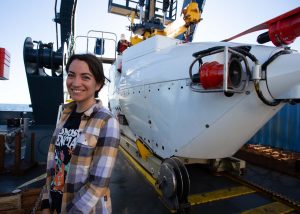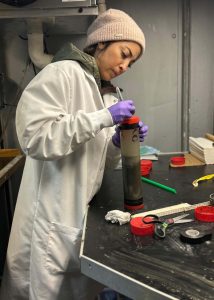
The newest scientist to join the UF/IFAS Fort Lauderdale Research and Education Center has been honored with a place on the Atlas of Inspiring Hispanic/Latinx Scientists.
Valerie De Anda Torres, an assistant professor of microbiology and cell science, joins more than 300 fellow scientists on the prestigious 2024 list, a grass roots effort developed in 2020 by researchers and celebrated faculty members working at universities and organizations. The Atlas showcases the scientific excellence of outstanding scientists working in a wide range of disciplines from mathematical biology and ecology to neurology. Each year, the list highlights the expertise and talents and of Hispanic scientific faculty in honor of National Hispanic Heritage Month, celebrated Sept. 15 through Oct. 14.
De Anda joins an influential group of scientists nationwide who are making significant contributions to their fields. This honor acknowledges her scholarly achievements, dedication to mentoring and commitment to diversity.
“Receiving this recognition not only validates my efforts and achievements but also reinforces the importance of visibility for women in science, technology, engineering and math (STEM),” she said. “When women are acknowledged for their contributions, it sends a powerful message to younger generations that they, too, can succeed.”
As a Mexican, first-generation, female scientist from a low-income background, De Anda witnessed and overcame many personal and professional barriers to pursue a scientific career.
“I’ve experienced firsthand the challenge of entering a world where your path to success starts with significant disadvantages,” she said. “I am extremely honored by this recognition, and it encourages me to continue serving as a role model, particularly for those from different backgrounds and reminds me of the responsibility I carry to show that our work matters.”

Two pivotal moments sparked De Anda Torres’ journey into science, and the questions arising from them continue to guide her research. Her fascination with geological time and extinct organisms began in childhood, further fueled by the movie “Jurassic Park” and its portrayal of DNA as a blueprint for long-gone species. Later, while reading a biology textbook, she discovered stromatolites, ancient microbial formations that produced earth’s
oxygen. This revelation about life’s origins in the Archean Eon cemented her desire to explore early microbial life, driving her scientific inquiry to this day.
In her role, De Anda brings a unique skill set of expertise to UF/IFAS and the Fort Lauderdale Research Center (FLREC) in the following areas:
- Microbial metabolism and evolution: She studies how microbial life evolves in extreme environments, combining lab, field and computational work.
- Integrated approaches: Her work spans disciplines such as microbial ecology, molecular biology and paleobiology to unlock insights into earth’s oldest organisms.
- A focus on ecosystems: De Anda Torres’s research explores how microbes maintain ecological balance in diverse environments, from deep oceans to hot springs.
- Setting predictive models: A key goal of her work is to develop tools that predict microbial behaviors in response to environmental changes — critical for future sustainability efforts.
De Anda earned a Ph.D. in microbial ecology from the National Autonomous University of Mexico (UNAM) and has held research positions at the University of Texas at Austin. Her work has garnered international recognition, from being a finalist for the LANGEBIO Award in Mexico to presenting her findings across 10 countries.
“Throughout my academic journey, I’ve come to understand that success in science is not just measured by individual accomplishments, but by the impact we have on those around us,” she said. “Without a doubt, the most rewarding aspect of my career has been mentoring and guiding over 30 scientists and contributing to their academic and professional development. Seeing them succeed in various fields—whether in academia, industry or education—has been one of my greatest accomplishments.”
Her contributions are expected to deepen the center’s research and advance its mission to address pressing ecological issues. With her expertise in microbial ecology, FLREC is poised to expand its efforts in understanding nutrient cycling, ecosystem resilience and the role of microorganisms in combating climate change.
“The opportunity to join the Fort Lauderdale Research and Education Center, with its proximity to the ocean and access to unique research sites, is a dream come true,” she said. “I’m excited to collaborate with such a talented and interdisciplinary team.”
As a passionate mentor and advocate for diversity, she’s also looking forward to inspiring and guiding the next generation of scientists at UF/IFAS.

“Representation is key, especially when young girls see women succeeding in science, because it opens doors for them to envision their own futures in these roles,” she said. “This honor reinforces my dedication to mentor, support and create opportunities for the next generation of female scientists. I want to be a role model empowering children who can see themselves reflected in scientists like me.”
She plans to host annual events, including an International Day of Women and Girls in Science, to inspire young girls and showcase diverse female scientists as role models.
###
Para accesar a este contenido en español, por favor utilice este enlace.
ABOUT UF/IFAS
The mission of the University of Florida Institute of Food and Agricultural Sciences (UF/IFAS) is to develop knowledge relevant to agricultural, human and natural resources and to make that knowledge available to sustain and enhance the quality of human life. With more than a dozen research facilities, 67 county Extension offices, and award-winning students and faculty in the UF College of Agricultural and Life Sciences, UF/IFAS brings science-based solutions to the state’s agricultural and natural resources industries, and all Florida residents.
WHY FOOD IS OUR MIDDLE NAME
Feeding a hungry world takes effort. Nearly everything we do comes back to food: from growing it and getting it to consumers, to conserving natural resources and supporting agricultural efforts. Explore all the reasons why at ifas.ufl.edu/food or follow #FoodIsOurMiddleName.
 0
0
